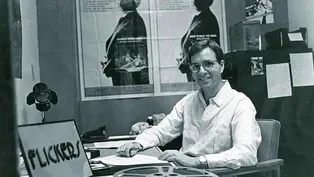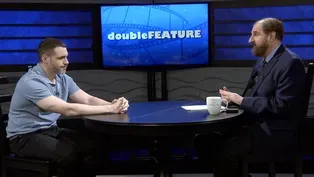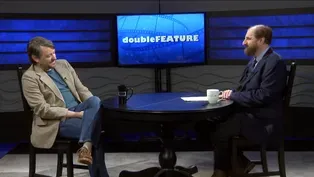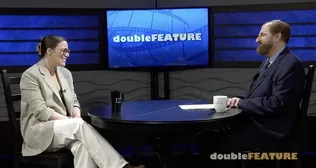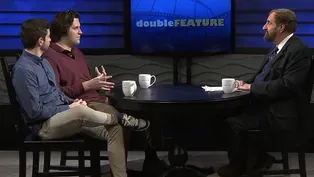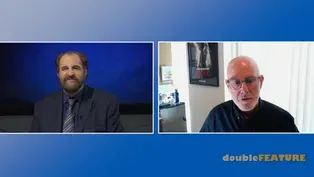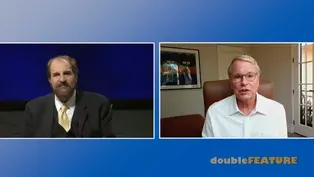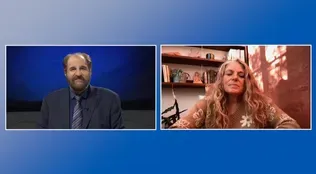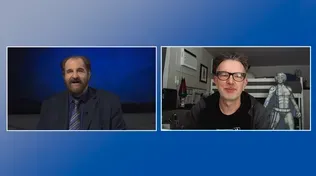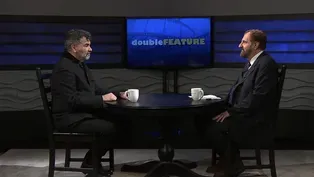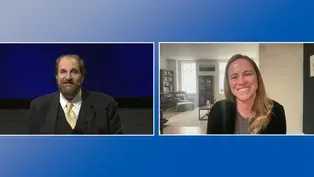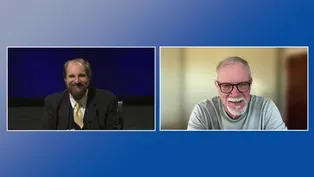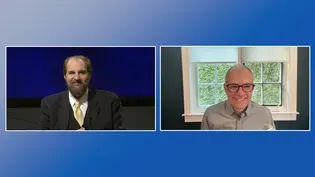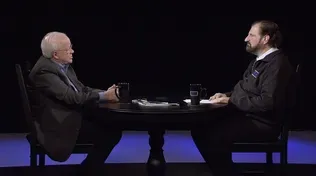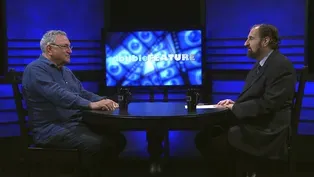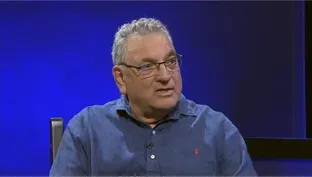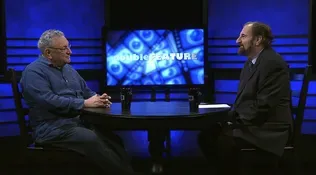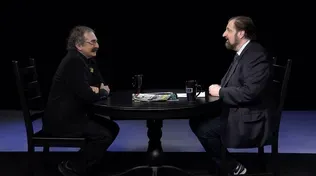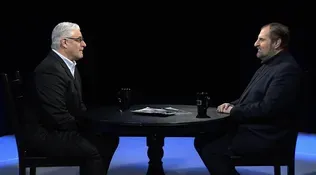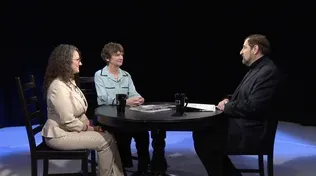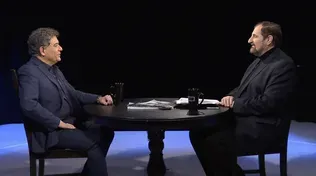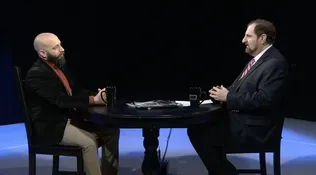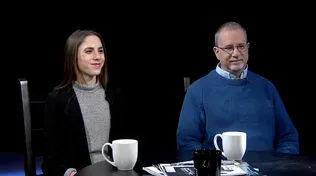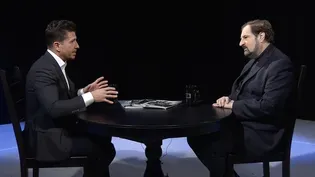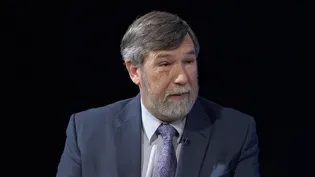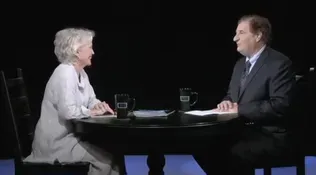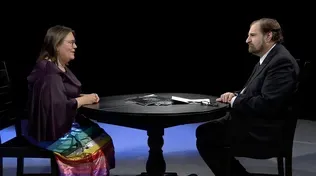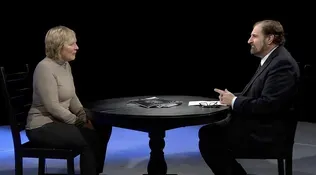
Interview with Angela Peri and Lisa Lobel
Clip | 45m 25sVideo has Closed Captions
Interview with Angela Peri and Lisa Lobel
Steven Feinberg, Executive Director of The Rhode Island Film and Television Office interviews casting directors, Angela Peri and Lisa Lobel, who through their casting agency (Boston Casting) have worked on recent films such as "American Fiction," "Knives Out," and "Coda."
Problems with Closed Captions? Closed Captioning Feedback
Problems with Closed Captions? Closed Captioning Feedback
doubleFEATURE is a local public television program presented by Rhode Island PBS

Interview with Angela Peri and Lisa Lobel
Clip | 45m 25sVideo has Closed Captions
Steven Feinberg, Executive Director of The Rhode Island Film and Television Office interviews casting directors, Angela Peri and Lisa Lobel, who through their casting agency (Boston Casting) have worked on recent films such as "American Fiction," "Knives Out," and "Coda."
Problems with Closed Captions? Closed Captioning Feedback
How to Watch doubleFEATURE
doubleFEATURE is available to stream on pbs.org and the free PBS App, available on iPhone, Apple TV, Android TV, Android smartphones, Amazon Fire TV, Amazon Fire Tablet, Roku, Samsung Smart TV, and Vizio.
(brooding music) - Hi, I'm Steven Feinberg, executive director of the Rhode Island Film & Television Office.
Tonight, I am so honored to have the most outstanding casting directors in the country with us tonight.
We're talking Angela Peri and Lisa Lobel of Boston Casting and Rhode Island Casting.
Some of their films are movies you know about: "Knives Out," "Equalizer," "The Holdovers," just to name a few.
Welcome to "doubleFeature," and welcome home to Rhode Island.
- Yes.
- Thank you.
- Thank you for having us.
- You guys, you've just won a... What?
Golden Globe?
For "The Holdovers."
- Yes.
- Yeah, two acting awards.
- Two acting awards.
You're casting directors.
It's what ya do, and I have to tell you, the one time I was jealous, one time, was a couple years ago when the movie "CODA" came out, and it was the last film I had seen before the Oscars.
I'm getting chills as I talk about it, and I said, "I wish that movie was made in Rhode Island."
It was so well done.
- Thank you.
- Your casting on that.
It won a Best Supporting Actor?
- Won an Oscar.
- That's what I'm saying.
- Best Picture, yeah.
- Yes, best picture.
- And Best Picture?
- Mm-hmm.
- But Best Supporting Actor?
- Porting Actor, yes.
- You discovered people.
- So many people.
It was... We had to find so many people in the deaf community for that film, just like "Sound of Metal."
Lisa had to find so many people that were in the deaf community, and it just elevated the business once again, because here we are now the experts.
- [Steven] Yes.
- Yes.
- Yeah, it was interesting because, even though they didn't come out at the same time, "Sound of Metal" and "CODA," we prepped them at the same time.
- Wow.
- So at the same time, we were immersed in deaf culture, deaf actors, learning ASL, bringing in interpreters to our sessions, and it was exciting.
- It's an adventure, right?
- Yeah, it's an adventure.
- Every project you have's a different adventure.
Now, you're both members of the Casting Society of America.
You've won awards.
Those are... What're they called, the awards at- - [Angela] Artios.
- [Steven] Artios Awards.
- Which is the Latin word for perfect fit, because that's what we do.
We create these films that we put the actors in that're the perfect fit.
- Now, lemme ask you each about yourselves and how you get started.
I know, Angela, you founded Boston Casting in 1991, and Lisa, you came aboard... What?
1996 or so?
- Mm-hmm.
- Yeah.
- I'm gonna ask each of you.
How did you get started in casting and film?
And was it something you always wanted to do as a child?
- Well, it's a funny story.
Poor Lisa's heard it a million times, but I will tell it again for the Rhode Island viewers.
I wanted to be an actress, and I couldn't find any work, because I had a horrible Boston accent, which I still sort of have, but now I've embraced it.
- I don't hear it.
- Not horrible.
- I thought you were from Texas.
- It's not horrible.
- So, I decided to go into standup comedy.
And then I was really smart and industrious as a young person, and I thought, "Ooh, I'm gonna go where they're dishing out the work, so I started interning for casting companies, and I did it here in Boston.
I did it in Los Angeles.
I did it, in all places, of Rome, Italy.
I was helping my agent in Rome cast some commercials.
And then I just came home, and I decided, you know, I wanted to either open a restaurant... And I didn't have enough money for that, so I decided: "Well, I know how to do casting."
So I opened up Boston Casting, and that's how it started.
- Wow, and looking- - When I turned 30 years old, because I was just... You know, being an actor's so tough.
It's very tough.
- It's just a hustle that you just never know where the next dollar is coming from, and I was tired of that.
I was good at casting, and I decided I wanted to become an entrepreneur.
- When were you in Los Angeles?
- '80s, in the '80s.
I was at the Comedy Store.
- That's when I was there.
- I was at the Comedy Store as a standup comedian.
I did comedy when Ellen DeGeneres, Jeanne Garofalo, and Denis Leary... We all started at the same time.
It was really a crazy time, '85.
- Yeah, I was hanging out there too, not as a...
I never wanted to be a comedian, but I remember, like, Andrew Dice Clay was coming out and the Wayan Brothers, Damon Wayans and those guys.
Yeah, wow, and what about you, Lisa?
What was your background?
- So, I was a preschool teacher after college.
And then I met my husband, who worked in production, and he and Angela were actually working on a student film together; we were all so young; with- - [Interviewees] James... James Gandolfini.
- Oh, wow.
- A BU student film before James Gandolfini was James Gandolfini.
- And this is in Massachusetts?
- [Angela] Yes.
- Yeah, BU- - We put him- - Student film.
- In his first film.
- What was he doing in Massachusetts?
- He came to be in the student film.
- On the train.
- Came from New York.
- Yeah, and he slept on a friend's couch.
- Wow.
- It was Randy Newman's son's film.
- "Tornado Lane."
- Yeah, no, but the dads were very big filmmakers, so they had money to make this film.
Anyway, I thought it was interesting.
Angela and I met.
We got along, and I was kinda looking for the next thing, and she got on a movie and said, "D'you wanna join me, you know, casting thousands of extras?"
And I did it, and I just loved it.
I felt like there was so much we could do with this business together.
- You had a chemistry together.
- Yes.
- 29 years later.
I mean, it's still... We're just still going strong.
- That's fabulous.
I like you.
When I looked at your website and I saw how many folks you have working with you... That's a pretty large agency, and you should be very proud of yourself.
- [Interviewees] Thank you.
- You're really expanding and branching out and doing so many wonderful things.
Let's talk about casting.
And there's different productions, right?
You've got your Hollywood productions.
You have your independent films.
Do you love doing the Hollywood shows?
Yes.
They pay well.
You know those films are going to get made, because the funding is there.
You have a opportunity to shine, right, and do that?
But what about the independent films?
How're... Now, those... You get a fee up front to cast a film?
And then you work on it for X amount of time.
How do you manage, like, about doing independent films and studio films, as example?
- Well, I would say that we take every project.
We put the same amount of love and attention into it.
- Exactly what I was gonna say.
- Whether it's a small feature, an indie- - [Steven] Like "CODA."
Like "CODA."
- Or like "CODA," exactly.
- It was a tiny indie.
- "CODA" was a tiny indie.
- Yeah.
- We would... "CODA," I always say, is the chugga-chugga film, the little train that could.
She had so many obstacles, poor Sian Heder, and she overcame them all, and it went all the way, won Sundance, won the Oscars.
It was incredible, and to be part of that was just so wonderful for us.
But yes, obviously, the feature films, the big-budget stuff is so exciting because then we're up for Artios Awards.
- Yeah, but I think part of the key to our success has been that we take every project as if it was, you know, "The Holdovers," "CODA," whatever.
You know, every project is so interesting and different and creative, and they all deserve, you know, our same expertise, and we really give them all the same.
- Yep, now, if I'm a filmmaker... Let's say I'm a filmmaker, and let's say I don't have a cast, and I'm trying to get a budget together.
Would I come to you guys and say, "You know"... You guys are more like, "We're... You have to have your money in place."
- Bingo.
Come to us when you have the money.
We are not holding your hand.
No, we can't get Ben Affleck for your movie, sorry.
We get that all the time: "Hi, can you call John Krasinski for us?"
"No, sorry, we can't," ya know?
- Well, that's important for the audience to know.
You guys are... You're not there to try to get financing for a film.
You're not there... You are there to say, "The funding is in place.
The movie's a go or hopefully a go."
- "We already have this actor, this actor attached," you know?
- Yeah.
- And that's when we- - That's when you guys come.
- Come in.
Yeah.
- So you're not always going to get, like, the top actor, as an example.
- The top actors in our region.
We are the casting directors for New England so Massachusetts, Rhode Island, New Hampshire, Vermont, Connecticut.
We will find you the best actors within that community so that you do not have to fly anyone in, you do not have to take a train to come in or to be put up.
- So when you're doing a movie like "Ted"... You did Ted.
- [Lisa] Mm-hmm.
- [Angela] One and two.
- Very sad movie.
Made me cry.
So funny, so funny.
- [Angela] The TV series is coming out now.
- I can't wait.
I can't wait.
Seth.
- And we worked with Sheila because she called us because we had to find some Boston guys.
- Good.
- Even though they shot it in L.A. - Right, so, Seth, having gone to RISD... And he was inspired and did "Ted."
So when you're doing "Ted," as an example, they know that they've got the voice of Seth to play Ted and they've got some of their people that they got out of L.A. or New York.
And then you guys come and round it out.
- Everything else.
- Yeah.
- We do...
There's usually four to six actors that come from L.A. And then we do everything else.
We do anywhere from 20 to 65 speaking roles and anywhere from 1,000 to 4,000 extras.
- Thousands.
- Non-speaking roles.
- Wow, that's a lotta work.
- It's a lot.
We put a lot of people to work, not that we're their employer.
We're not the employer, but we're the middleman.
- You're right, right.
- We're the middleman.
Get yourselves in our database.
Where's the camera?
Get yourselves in our database.
Get yourself in the database, and you too could be in a movie.
Ya know?
It's- - Can... You know, I saw an obituary the other day.
- Aw.
- And no, the...
I didn't know the person, but I'm reading about the obituary.
You know what one of their highlights was?
- They were in a movie.
- They were in a movie, and that- - And it was in the obituary?
- Yeah.
- It was in the obituary.
- So proud of that.
- That was something that was a highlight for them, that they were in a movie, and I was choked up because that was something new.
- It gets run-of-the-mill for us, but sometimes, we forget what that means.
- When you...
I was talking to my late grandmother, and I asked her about her life.
She was 95, very clearheaded, and I said, "Oma, what do you remember?"
She said... She started talking about the trips she took and the loves of her life.
(Lisa laughs) (Angela laughs) You think about... For some people, being in a movie is very unique, and that is like going on a special vacation, so what you do isn't just for the story, but you could be changing a person's perspective on life, which is kinda neat.
- It's to feel nice.
- True, and then also, the young people that we find that go on to be huge movie stars.
- Well, you said James Gandolfini.
- John Krasinski.
- James Gandolfini, we put him in his first movie.
John Krasinski, we put him in a Dunkin' Donuts commercial.
- [Lisa] First commercial.
- Wow.
- Matt and Ben, I knew them- - He went to Brown.
He's a local.
He went to Brown.
- Matt and Ben, we've known them...
I've known Matt- - Matt who?
Ben Who?
(Lisa laughs) - Matt Damon and Ben Affleck.
We met Ben when he was like- - Eight.
- Was he doing PBS or something?
- Yeah, he was doing PBS, "Voyage of the Mimi," when he was eight.
And then Matt, he'd be like, "Hey, can I bring my"... - Buddy?
- "Buddy to the audition?"
And I'm like, "Yeah," and the two goofballs would walk in.
It was...
It's been a really...
It's been quite a career.
It's been quite a career.
We're so fortunate, so fortunate.
- When you get a script, like you just mentioned... You know, you're getting a script, like, let's say, "Knives Out," right?
You've got a film like "Knives Out."
So, you're getting the script.
Just to explain to the audience, you get a script.
You have to highlight who the characters are, right?
And you have to do a breakdown of each character.
And then you will have in your... Will you have people in particular that you think are right for it, for the experiences that you've had and meeting people?
Or will you say, "All right, I've got these 10 or 15 people I think might be right for it, but then I'm gonna go to the database"?
How do you work it?
- It's interesting.
I wonder if we do it the same (laughs) way.
I start fresh every time.
I go in fresh.
I don't take old lists.
You know, we have this great searchable database.
Everyone can get in there.
It's free.
And we just start looking at the age ranges, ethnicities, anything that the character might... And then you kinda weed it down, right?
So you get a big list.
And then you kinda cut down, cut down, cut down.
I don't typically take old lists.
I like to go in fresh every time with a brand-new outlook of that character.
- Do you- - I do it from my brain.
I do it because... And usually, the first person I think of usually gets the job.
Then I go into the database, but I like to, like, use my brain as a sponge.
- Absorb.
- And just, like, squeeze out... "All right, who do I think can play the bartender?
Oh, boom, boom, boom.
Boom, boom, boom."
And I list the characters.
Then I'll go in the database and see what missing.
- Do you guys powwow?
- Oh yeah.
- Ah, yeah.
- Are you kidding?
- You say, "All right, let's go through our... Let's go and talk about this Johnny.
- Yeah.
- Yes.
- "Who do you have for Johnny?"
- Yeah, we'll take the whole staff.
- The whole staff.
- Into that.
- We have a giant dry-erase board, and we take like six or eight casting directors in the room, and it's like a power hour, where, like...
I needed a drug addict for "Kevin Can F Himself," and I brought these guys in, but nobody had that danger.
- Edge.
- Ya know, ya had to have that edge and that danger.
And then Hilary, one of our casting directors, thought of a guy, and I was like, "Ah."
- "I didn't think"...
Right, right, right.
- 'Cause, a lotta the times, we're working independently on different things, so we'll say, you know, "Two shows ago, I saw this kid.
I didn't know him before, but you should really see him for that," you know.
- It's funny 'cause I saw...
I forget the (huffs) name of the movie.
It was a sci-fi movie.
I think Danny DeVito was a producer on... And it was the first time I had seen Jude Law.
- Oh wow.
- And I remember going, "Who's that guy?"
- [Lisa] Yeah (indistinct).
- Mike Fenton had cast that film, and it ended (chuckles) up becoming Jude Law.
- Mike Fenton was my first audition when I was in Los Angeles.
- A 20th Century Fox?
- Yep, and I walked in.
My friend and I walked in.
- What movie?
- I don't... No, it was just a meet-and-greet, and we walked in, and we were both in white, and he goes, "Look, two Italian angels."
It was so amazing, - Aw.
- But then, I think, my accent threw him off, 'cause I never heard from him.
- It was a treat working with him.
I mean, he had Stanley Kubrick calling up.
He had Steven Spielberg.
- They brought him on in a wheelchair at one of our Artios Awards.
- Mike in a wheelchair?
- Yeah, getting a Lifetime Award.
- Lifetime Achievement Award maybe like five years ago.
- Yeah, he passed away.
- And he has since passed, yeah.
- Mike was a runner.
He used to run all the time.
- He did?
- Yeah, he was a runner, totally great shape, and he and Frank Marshall, the Steven Spielberg, Kathy Kennedy...
So, Mike and Frank would run, every Saturday, together.
- [Angela] Really?
- [Steven] Mike was... Like I said, he was the first president of the Casting Society of America.
- And... Oh, go ahead.
- He did "Chinatown," "Godfather II," "E.T.," "Raiders of the Lost Ark."
He discovered like people Nick Cage.
I was doing the videotaping of them.
- Oh my God.
- They would come in.
Meg Ryan would come in.
- Oh my God.
- They were all new.
- Right, and he also created... Castnet it was called.
It was the first online database for actors, and he did that in the early '90s about the same time that we did it.
- Yeah, yeah, but I remember, you know, we would used to get in pictures all the time.
Are people still doing their professional- - Oh yeah.
- Pictures?
- Because the director needs it.
So, like, we're working with James L. Brooks this week, and all the actors had to bring in their headshot and resume so he could read... And he actually read them.
He said to Michael Costello, "Oh, you've been in L.A. for a while."
You know, it was really nice that he was reading the resumes.
- Right, so the audience knows, we have a movie called "Ellen MacKay" that James L. Brooks... James L. Brooks wrote "Mary Tyler Moore Show," created "Taxi."
He wrote and directed "As Good as It Gets," "Broadcast News"- - [Lisa] Legend.
- Huh?
- Legend.
- [Steven] Yeah.
- (laughs) He's legend.
- And "Terms of Endearment," and executive produces "The Simpsons."
And he's now in Rhode Island, directing this new movie with Woody Harrelson and Jamie Lee Curtis and Albert Brooks.
- We sign an NDA, so we can't speak about it.
- You didn't say it.
(Lisa laughs) - I know.
(laughs) - Oh, I can.
- (laughs) Yeah.
- Okay, actually- - It's in the trades.
- It's in "Variety," yeah.
- It's in the trades.
(Angela speaks indistinctly) - It's in "Variety," so that's fine.
- You didn't hear it from us.
- But he's...
I call him legend when I see him, and he's spry as can be.
Can you talk a little bit about...
So, your process is you go through the... You get the script separate.
Do you talk to the director... Tell me how you're approached originally on a project.
- We usually just get a random phone call.
- From the production company?
- Sometimes, director, producer.
- I think it's- - People we've worked with in the past.
- With before, yes.
Our reputation, it precedes- - Word of mouth.
- And sometimes, it's a casting director from L.A., so it might be an L.A. casting director.
It might be a director.
Might be producer.
Might be a friend of a producer that we work with, you know, a referral.
And then we start getting a little bit of info.
Then we do a meeting.
- Then we get a breakdown from the director.
Then we have a meeting with the director to make sure that we're going in the right direction.
- You're on the same page.
- We don't wanna waste our time.
Like, I had a movie with David O. Russell, and "the plumber, the plumber, the plumber," so I bring in all my plumbers, and he goes, "Didn't anybody tell you that the plumber is Haitian?"
And I was like, "Oh my God, (Steven laughs) nobody told me the plumber is Haitian."
So for those, well, you have to have the director approve what we're working on, 'cause we don't wanna waste our time.
We have so much... We have sometimes six-eight movies at a time going on, and commercials.
- In your time, right?
- [Lisa] Right.
- So like, on a project like "Ellen MacKay" that you're doing now, how much lead time do you have?
The film starts- - Six weeks.
- Most movies, six weeks.
- [Steven] Six weeks?
- Mm-hmm, till the first shoot day.
- And that gives you enough time to cast everybody?
- [Lisa] Mm-hmm.
- And extras?
How much do you have to go through other approvals?
Like, when you're getting extras, 'cause everybody wants to be an extra...
Right?
So do you have to go through approvals?
Like, do some directors work differently with you than others?
- Mm-hmm.
- Where the... - [Angela] Urgh.
- Some pick every single one.
(Angela laughs) Some need boards ahead of time with every face on it, and they handpick exactly who's gonna be in there.
Sometimes, that starts at the beginning.
And then they start thinking, "Okay, they get it.
Now they can start sending people."
- "We're on the same"... "We can understand."
- Yeah, I don't blame them.
I mean, there may...
There's a lot of money on the line, a lot, you know, at stake.
- We had one director that had all of the extras line up in rows with numbers on the floor, and they had to stand on their number.
And then he went through each row and would pick people.
Yeah, that was kinda crazy.
I don't wanna say who (chuckles) it was.
(interviewees laugh) - I'm kinda think I might know, but I might not know.
- (laughs) Yeah, no, I'll tell you after.
- Oh, good.
Tell me about working on "The Equalizer."
- Urgh, "Todd Black," those producers, I love them.
So, we did "Equalizer 1," "Equalizer 2."
Antoine Fuqua.
They were here during the marathon bombing.
It was crazy, but we still went ahead and had our callbacks.
I would show him one or two people.
One or two actors he would call in, and he would just hire.
- [Steven] Antoine Fuqua?
- I'd say, "You don't wanna see more?"
And he goes, "No, I asked you for a plus-size ethnic woman, and that's exactly what you've brought me, so I'm gonna pick one."
I'll never forget it.
I was like, "Wow, that was easy."
He was wonderful to work with, and we did "Equalizer 1" here and "Equalizer 2."
And then- - [Steven] Italy.
- They went to- - Italy.
- Italy because the tax incentive in Rome, 40%, and they changed the whole script so that it was set in Europe, because we can't...
I mean, we can make Boston look like Paris.
I don't know if you can make Rhode Island look like Europe.
- We made Rhode Island look like Rome.
- You did?
- Yeah, we did a movie called "The Polka King" with Jack Black.
- [Angela] I love "The Polka King."
Jackie Flynn was in that.
- [Steven] We turned our state house into the Vatican.
- [Angela] That's what we did, too.
- [Lisa] Jenny Slate.
- We turned our state house into Paris, the back of the state house.
- Oh, nice.
- For "Pink Panther 2."
- Oh, right.
- Yeah, but I... You know, Equalizer is a great franchise.
I'm sure there'll be number four.
I stay in contact with those producers.
- I love those.
- They're so wonderful.
- Todd Black helped me sell one of my first projects.
- He did?
- Yeah, I did a movie called "Fortress," and Todd was working for a gentleman named Joe Wizan at the time.
And then he was the one to send it over to 20th Century Fox, and we sold it.
- You need to shoot him an email today and say his name came up.
(Angela laughs) - I will.
I haven't spoken to him in years.
- He's wonderful, wonderful.
- But his company's Escape Artists.
Yes, I love their- - He did "Mo Rainey's Black Bottom."
- So good.
- That movie was so fantastic and didn't get the acclaim it should've.
Wonderful.
- What is the favorite part of the process for you as a casting director?
- Finding diamonds.
"Finding diamonds," that's what I say to the staff: "We're diamond mining."
We found a diamond yesterday.
- [Steven] Did you?
- We found a diamond yesterday, a 5-year-old.
Boom, took direction, right on his cue, could emote sadness.
He was unbelievable.
Five years old!
So when you...
When they say that people have a natural ability for acting, it does exist.
It does exist.
You know who else had that?
Jennifer Lawrence.
David O. Russell used to say, "I don't think she ever had an acting class," or maybe she did one or two, but she was a natural.
- Well, it's like- - There are people in this world that are a natural ability to perform, and I saw one yesterday.
We found a diamond.
Jennifer Lawrence was a diamond; John Krasinski, a diamond; those kids.
- Henry Thomas when he did "E.T.," and Mike was doing that.
- Yeah, unbelievable.
- And everybody's crying.
"Kid, you're hired."
- [Angela] What's your favorite part?
- This has evolved for me, but now I love the beginning.
I love that feeling of, like- - New project?
- Meeting the... Yeah, like, when Alexander Payne came in with "The Holdovers'" script and he only had Paul Giamatti and he came in by himself, like, "D'you think we can do this?"
and you're just like, "I don't know."
You know?
And every time- - [Steven] I haven't seen it.
I'm looking forward- - I still get nervous- - To seeing it.
- Every time, going, "How am I gonna do this?
How're we gonna do this?
Oh my God."
Then we do it, and like, it's just... You know, I love that.
I love that.
- Tell Steve (chuckles) the story of "Sound of Metal."
- The meeting.
- Yeah, the meeting.
Tell him the story.
(Lisa laughs) - Like we said, we get a call.
Then we get a meeting, so we meet with the director, came to our place.
We put out the coffee and the donuts and do the whole, you know, dog and pony show hosting and all of our work and chatting with him, and great, great, great.
Great meeting.
Darius Marder is his name, and he said, "Great, I love you guys.
I think this is good.
You know, we're good to go.
I'm gonna hire you guys."
"Thanks, great."
Starts walking out, and he said, "Oh, by the way, just so you know, every actor you're gonna be casting will be deaf."
(Steven laughs) - And we will like.
- "Yeah."
I, at that point, had never met a deaf person.
(Angela laughs) And we just nod and say, "No problem."
- And then he says... - Oh, and then "Jenn is a very important role.
She's gonna be deaf.
She's gonna be gay.
She needs to be very funny."
- A comedian.
- Yes.
- And we were like, "Okay."
- So we were like.
- Wow, that's a very- - And Lisa found them.
- We got her.
Yeah, we found her.
- Lisa found her.
- She was amazing.
- So he had... - Amazing.
- He made sure that every actor was deaf.
- Every single one.
- They couldn't act deaf.
- No.
- They had to be deaf.
That the actor had to be gay.
Couldn't act gay.
Had to be gay.
And a comedian?
- And a comedian, standup comedian.
We found her.
- We'll say, like, "LGBTQ encouraged to audition."
You know, we wouldn't, like, cut it like that, but you've gotta portray it believably.
- How long did it take?
How many parts were there for that?
- About 25?
- For the deaf?
Yeah, I mean, the main deaf cast, like, in the house was probably like seven or eight.
Then we had the whole school with lots of kids, also all deaf.
I don't know the numbers offhand but a lot.
- But how long did it take you to... You only had six weeks again?
- Six weeks.
- Yeah.
(laughs) - Yeah, six weeks.
We've been doing this for so long.
We have our timeline down.
Like, I know within five days- - How it's (indistinct).
- How we have to push it.
And then luckily, we have a huge staff where we call it the War Room.
How's that for a Boston accent?
And everybody goes into the War Room, and we just get six or seven casting directors to help us.
- And we start with the big, big roles, so that way, if those are hard... You know, the easy- - One-liners.
- Smaller roles are gonna be easy.
- Right.
- Right?
A lot of actors can do those, so we start with the big ones that're very important that the director's gonna have a lotta vision on, a lot of opinion on, and we take those first, you know, four-five-six of those.
And then you know that that's working, and you're still working as you can...
It's like a wave.
Then you start going into the next roles, but if that's gonna take more time, you always wanna start that first.
- Are you videotaping these actors?
- [Angela] Callbacks, yes.
- So an actor will come in first time.
- No, first time's- - First time, they do it- - Self-tape.
- At home now.
- "Self-tape."
- They self-tape.
- And they send those to you, and you're looking at them, and you guys are in your War Room.
You're saying, "Ooh, look, this."
When do you share that with the director?
- A few days later.
- Yeah.
- So, you share the self-tape.
- We do rounds of casting, so I think directors expect tapes from us once or twice a week.
- Twice a week.
- And for different roles.
And then we wait for feedback.
You know, if they say, "Oh, this one's looking too young, and you know, go- - It's another thing about our office is we're swift.
We get it done.
We do not mess around.
That's been part of our sterling reputation.
- How many...
If I have a...
There's a role, the role of Jack, and he's 45 years old, whatever, so how many will you submit to me as a director?
Like, how much culling will you do?
- Depends.
I think it depends on the director.
Some love to see tons and tons, and some like to see less.
- When you say tons and tons?
- Four to eight.
- Okay, not 20.
Right.
- We will... We'll send it out to 45 actors.
30 will... 27 will submit, and out of that 27, we send four to eight, right?
- But we might send more the next round.
We start with little chunks.
'cause a director can get overwhelmed and they have a million other things happening, right?
- Right.
- Location.
You know, there are...
So we like to give them just what they need at the time.
- Chunks, little chunks.
- So it might be four to six.
Then the next week, if we don't cast, we do more, we do more, we do more.
- So if... That role of Jack let's say, and you have, let's say, maybe 20 people in your head that you think might be good, and you have a favorite.
Let's say you have a... Do you have a favorite, like, often?
- No, I have the top five to eight actors in this community that I know can do anything.
You?
- I like to let it run its course.
Like, I try... - Like my grandmother used to say...
They'd say, "Who's your favorite?"
She said, "I don't have any favorites.
I love yous all the same."
And that's how I feel about the actors.
Like, how could ya have- - Well, it's also an art.
Like, you're making... Like, if you're the director, this is your piece of art.
- Right.
- You know?
- Correct.
- So what my favorite is or Angela's favorite... You know, you've probably been working on this for years.
- Right.
- You know?
So I love to let it be organic and not give opinions too much right away or, you know, let the art kind of find itself.
- So let me ask you something.
Let's say I wrote a project, right, that I'm gonna direct, and let's say I thought, "Man, I wish Jack Nicholson was available and 65 years old.
Would I share that with you as a director?
- Oh yeah.
- And say, "Ya know who I would want?"
- All the time.
- "I would wish Jack Nicholson is 65 years old.
That's the guy, and if you read the dialogue, it's like he's saying it."
- [Angela] Right.
Yeah.
- That's the best...
I'll push directors to say, "Please, be as descriptive as you can, age, ethnicity, economics, everything about this character that you can tell me, 'cause that will allow me to go in and find you exactly what you need."
- And then sometimes, they change their mind of the vision.
They start seeing tapes and seeing actors.
And then they say- - "Oh, wow, I"- - "Oh, this is not what I was thinking, at all, but I'm gonna turn a direction here and do this."
- "Because you brought me some magic."
- Yeah, something magical that maybe wasn't what they had asked for, but we saw something in it that was worth... - Are there...
So, you've dealt with a lotta different directors.
Oh my... - [Angela] Oh my God.
(Lisa chuckles) - Everybody, like, whether it's a Ben Affleck directing or whether it's a David O. Russell directing.
Now you're dealing with James L. Brooks.
What's the director... Who did "Knives Out"?
- Oh, Rian Johnson.
- Rian Johnson.
- Please, I had a sit-down with him, and I was just so in awe.
I was almost shaking.
I was just writing everything he said.
It was really amazing.
- Talk about it.
- Right, it was really quick.
It was for...
It wasn't for "Knives Out."
Him and Bam, they came for something else.
I forget what movie it was, but- - Before "Knives Out"?
- Yeah.
After "Knives Out" maybe or maybe before.
- He did the "Knives Out 2."
He did that sequel.
- Yeah, but that wasn't here.
- No.
- But yeah, it's pretty amazing, and we've worked also for...
I always get... Ryan Murphy.
And then Rian Johnson?
Is that him?
The "American Horror Stories" we- - That's Ryan Murphy.
- Yeah, that's Ryan Murphy.
- Right, right.
- But then who's the Rian that did "Knives Out"?
- Rian Johnson.
- Johnson.
- Johnson, yeah, I get those two confused all the time.
We've worked for both.
We did a couple of episodes of "American Horror Story" that was shot in Provincetown, and we had to find one of the girls, the performers, that go back, contortionists, to play some sorta demon, yeah.
- Demonic, right?
Demonic.
And you work on "Measure of a Man" locally.
That was a film with Donald Sutherland.
You did "NOS4A2" for AMC.
That was AMC.
- [Angela] And we had to find demon children.
- [Steven] Yes!
- [Angela] I was, like, so... 'Cause we don't... We're moms.
- Yeah, not horror genre.
- So we're trying not... - No, we try to really prep all the parents, like, "Listen, we're putting fangs in your kid, and if your kid's gonna not be able to handle this, you need to let us know."
And then we just got the moms that were like, "No, my kid loves this stuff."
And we're like, "Okay."
- It was Christmasland, the little vampires.
- Christmasland!
Remember?
- Yes.
- Oh my God!
- What about... You also worked on "Bleed for This," (Angela gasps) the Vinny Paz movie, Miles Teller.
- [Angela] Can I tell you... Can I talk about "Bleed for This"?
- Yes, please.
- 'Cause that was like, "Thank you, Chad Verdi."
Chad Verdi, woo-hoo!
- Yeah, such a great- - Bringing all the work- - Film.
- To Rhode Island.
Thank you very much.
So, "Bleed for This"... Now, of course, I'm Italian American.
I have all brothers and cousins.
We were big Vinny Paz fans because he's my age, so when I came, I was so excited to meet with him, because I had to recreate his entourage, so as I did in "The Fighter," when I had to recreate that, that family- - Family.
- We had to go and meet the sisters, which was another story, so when I came to meet Vinny's entourage, they said, "We're gonna take you out to lunch.
Come and meet us.
We're going to Federal Hill."
I said, "Okay.
Never been there."
Red, white, and green down the street.
So we go to the restaurant.
They all... All the Italian guys ordered scungilli.
Now, I haven't heard that word since my grandmother died.
Scungilli is eel, and they used to hit the eel over the head, skin it, cut it up, and fry it, and put it on top of salad.
Hilarious.
I was like, You guys were all eating scungilli."
It's so old-world Italian I didn't even think there were restaurants that still served scungilli.
But I really got into his trainer.
- [Steven] Kevin Rooney.
- Yep, and his cornermen.
No, well, who was the old Italian guy that trained him?
- Well, Angelo was his father.
- He was... Angelo was his father.
Now, that's another story.
So, Chad wanted...
Here is the thing.
Lemme tell you- - [Steven] Ciaran Hinds.
- Ciaran Hinds, and I was so against it.
I said, "How dare you.
We're gonna have an Irish guy from Ireland."
- "Danny Aiello" would've been perfect.
- I was so against having an Irish guy play in Italian, and I must say, Chad Verdi, I was wrong.
You were right.
That guy was so fantastic in that role.
- [Steven] Chad had asked me about him.
- He was so fantastic in that role.
The whole cast!
That role launched Miles.
I feel... Like, I know the drumming movie was good for him, but that movie was great.
(Lisa laughs) I can't talk enough about this movie.
The opening scene with them walking, walking into the ring... And his girlfriend's there, all dressed with her Louis Vuitton shoes, and boom, she falls down.
She trips her... - So funny.
- It's hilarious, but to cast that film, that's one of, obviously, my- - [Steven] I grew up- - Fortes.
- Favorites.
- Vinny and I grew up together.
- You did?
- Yeah, so, we used to go to basketball on Saturdays at...
I must've been 10, and there would be a fight in the locker room.
"Who's fighting?"
'cause you're out on the court, shooting, and there's a fight in the...
It was Vinny.
- Oh yeah.
- Then he and I were on the same baseball team, so we grew up together.
- Oh my God, how is he?
- I haven't saw...
I haven't talked to him in probably about three years.
- Nicky Varano had a party, and I saw him there.
That had to be like five or six years ago.
Handsome guy.
What a guy!
A heart like a lion.
A heart like a lion, and I'm so glad that his film got made.
I wish it had a better- - [Lisa] Box office.
- Yeah, more distribution, because I feel like it was a film that everybody should see, so again, it's called "Bleed for This."
Miles Teller filmed all 100% in Rhode Island.
- And Ciaran Hinds, I remember Chad asking me about him, and I had seen him in Munich.
- Oh, you did.
- And I said, "He is a fabulous actor."
- Fantastic.
- Yeah, I always thought Danny Aiello woulda been a great Angelo because...
But I really like Ciaran Hinds.
- No, he had that... - He's a great actor.
- He had the lines in his face that showed, like, history.
I can't say enough great things about that movie.
- He can do a lotta...
He is so great.
If you haven't seen "Munich," he's unbelievable in that, too.
So, what about "American Hustle"?
(Lisa laughs) - Those are my- - So long ago.
- David O. Russell... - [Angela] "American Hustle," "Joy."
What else was it?
There were three.
Oh, "The Fighter."
So, David O. Russell came here, did three films.
- Trifecta.
- And he was wonderful to work with, really tough, but I learned so much as a casting director through his vision.
- [Steven] Like what?
What did you learn?
- Like, he just had...
He would say things, like, about casting.
You know, he'd call me at two o'clock in the morning to talk about the cast and crazy stuff.
He was totally committed.
- Passionate.
- Passionate about each character, and you see his work, and it just amazes me that we didn't win an Oscar.
We did for Best... And I saw clips of it the other night.
What's his name that did "The Fighter," that played the lead in "The Fighter," with Mark?
Oh God, Christian Bale.
- Christian Bale, yeah.
- He was so unbelievable, and he won Best Actor for "The Fighter."
But I learned a lot about casting from David O. Russell, about how to dig deeper and to... That's why I always say to directors, "Tell me more about this character.
What were their parents like?
Like, what kind... Did they have a college education?"
Like, I wanna know that stuff because a blue collar's different than white-collar people, and just things like that that make us better.
- Do you find that... What's your take on rehearsals?
Some directors rehearse.
Some directors don't rehearse.
- Some don't.
And I don't mean to... - No.
- I find, for me, what I learned as a casting director when the actors are in the room, I don't rehearse, 'cause, usually, the first take's the best take for me anyway, for me.
- Unless you meant before the shoot with the- - Yes, before the shoot.
- Right, that's kinda... We're already done by then.
- You're done, right.
- Yeah, we put our cast.
We do all the contracts.
- When you're doing the contracts- - And then we're done.
- Are you putting in the contracts time for rehearsal?
- We don't do that.
We just do a deal.
We just do a simple deal.
They do that in production.
- Hollywood.
- The contracts?
- Yeah.
- The contracts.
Because it's interesting.
Like, Steven Spielberg is somebody who does not like to rehearse.
He said he used to rehearse and then, when it came time to shoot, he would lose that mojo.
- Yeah, I'd say the same.
- Sometimes, (indistinct).
Now, James L. Brooks is someone who does love to rehearse.
Another director, like Sidney Lumet who did films like "Dog Day Afternoon" or those kinds of films, he loved to rehearse.
- Alexander Payne did a lot of rehearsing.
- Did he?
- With "The Holdovers."
Yeah.
- And I guess... And especially if you're doing a smaller-budgeted film sometimes, you- - Each day really matters, and you can't waste time.
- Right, right, right.
What about... Any advice you would give to some young or not, just actors?
- We have a lot to say about that.
- Please.
- Yeah.
- [Steven] Please, share.
Please, share.
- I guess... You know what?
I feel like actors often second-guess themselves, right?
"Oh, I didn't get the part, because I did something wrong with my audition."
Then they call: "Oh, uh, what happened?
What happened?
I was terrible."
And I think... Just know that you're part of the process, you know?
If we invited you and you auditioned, it's because you're good enough.
We wanted you to audition.
For whatever reason... Maybe you look too much like the lead.
Maybe the whole character- - Height!
Height!
- Got cut or it got changed or it got... You'll never know.
Half the time, we never know either.
It just is what it is, so just know that you're putting your best foot forward.
We asked you.
We invited you.
We know you're good enough.
And then you leave it at... You know, you leave it there.
- And it's... We have to be honest, too, that it's sometimes challenging for actors to make a regular living, right?
- Mm-hmm.
- Yeah.
- And not everybody's going to be Matt Damon and make millions of dollars, et cetera.
- Yeah, and just practice, practice, practice.
You know, you just have to practice every chance you have.
- I have a theory on it that I think that actors...
This is what I...
I actually teach a class about this.
You have to change your mindset.
You have to now turn it into a small business.
And guess what?
You're the product.
You are now an entrepreneur.
You have entered show business.
It's called business for a reason.
Treat it like a business.
It isn't because my mother said I'm pretty, my grandmother said I'm a good dancer.
Forget it.
You have to write down every day where you looked for auditions.
You have to keep a book or keep it on your phone.
- How did I move my life forward?
- Yes, how do I... - How am I gonna get better?
- What's your goals?
What classes are you taking?
What classes have you not taken?
Do the casting directors know who you are?
- Networking.
- Just networking, yes.
It's like...
It's a business, so you have to treat it like a business, and when they take out the emotional part of it, like, "Oh, they didn't like me"...
Forget it.
Then you become successful.
- You have to... My friend said you have to have a... What is it?
- Thick skin.
- Yeah, yeah, Teflon skin or whatever.
- And you know, sometimes, you're bringing something.
Like, we sit with directors as we're auditioning actors, and we see they get sparked by things.
You know, your take on the character is part of the process.
You know, you're coming in.
You're doing it a certain way, and it's all part of those early days, you know, when you have nothing and these characters are getting developed, and you just have to know that you're contributing.
- [Steven] Right, you're an original.
- Yeah.
- Well, I think you guys are originals, (Angela laughs) and I wanna thank you both so very much of taking time outta your crazy, busy schedules, and I wanna thank you both for being on "doubleFeature" and really bringing so much professionalism to the community.
- (tuts) Aw.
- Thank you.
- And it means a lot.
- Thank you.
- And thank you for your friendship.
- Yeah.
- May I add?
May I have a closing?
- Yes, Ma'am.
- Please, go to boston/rhodeislandcasting.com.
Put your picture up there.
It's free.
Put all your special skills and any acting that you've done, because we wanna know you because we wanna put you in a... ♪ Movie ♪ (Angela laughs) - Thank you.
- Yeah.
The Legacy of George T. Marshall
Video has Closed Captions
Clip | 44m 58s | Remembering the founder of Flickers, George T. Marshall. (44m 58s)
Video has Closed Captions
Clip | 44m 59s | Steven Feinberg interviews director, writer, and actor, Tom DeNucci. (44m 59s)
Video has Closed Captions
Clip | 45m 2s | Interview with Alex Berard. (45m 2s)
Video has Closed Captions
Clip | 44m 59s | Steven Feinberg interviews First AD, Emma Barber. (44m 59s)
Interview with Chad Verdi Jr. and Paul Luba
Video has Closed Captions
Clip | 45m 31s | DoubleFeature shows films from around the world and takes viewers behind the scenes. (45m 31s)
Video has Closed Captions
Clip | 41m 15s | DoubleFeature shows films from around the world and takes viewers behind the scenes. (41m 15s)
Interview with Angela Peri and Lisa Lobel
Video has Closed Captions
Clip | 45m 25s | Interview with Angela Peri and Lisa Lobel (45m 25s)
Video has Closed Captions
Clip | 45m 45s | Interview with Jerry Ketchem. (45m 45s)
Video has Closed Captions
Clip | 49m 15s | Steven Feinberg interviews award-winning filmmaker, Elyse Katz. (49m 15s)
Video has Closed Captions
Clip | 44m 30s | Steven Feinberg interviews storyboard artist, Martin L. Mercer. (44m 30s)
Video has Closed Captions
Clip | 45m 19s | Steven Feinberg interviews Providence Pictures' Gary Glassman. (45m 19s)
Video has Closed Captions
Clip | 40m 24s | Steven Feinberg interviews producer Erika Hampson. (40m 24s)
Video has Closed Captions
Clip | 41m 56s | Steven Feinberg interviews directer/producer Joe Johnston. (41m 56s)
Video has Closed Captions
Clip | 45m 29s | Steven Feinberg interviews producer David Crockett. (45m 29s)
Video has Closed Captions
Clip | 42m 44s | Steven Feinberg sits down to interview the late film director, Douglas Trumbull. (42m 44s)
Henry Bronchtein Interview Pt. 3
Video has Closed Captions
Clip | 15m 25s | Steven Feinberg interviews director, producer, and production manager Henry Bronchtein. (15m 25s)
Henry Bronchtein Interview Pt. 2
Video has Closed Captions
Clip | 14m 51s | Steven Feinberg interviews director, producer, and production manager Henry Bronchtein. (14m 51s)
Henry Bronchtein Interview Pt. 1
Video has Closed Captions
Clip | 15m 33s | Steven Feinberg interviews director, producer, and production manager Henry Bronchtein. (15m 33s)
Video has Closed Captions
Clip | 37m 9s | Steven Feinberg sits down to interview producer and writer, Roger Lyons. (37m 9s)
Video has Closed Captions
Clip | 27m 31s | Steven Feinberg sits down to interview filmmaker Dante Bellini. (27m 31s)
Katie Reaves and Jennifer Jolicoeur Interview
Video has Closed Captions
Clip | 27m 7s | Interview with filmmaker Katie Reaves & Athena’s Home Novelties Pres. Jennifer Jolicoeur. (27m 7s)
Dr. Thomas Zorabedian Interview
Video has Closed Captions
Clip | 27m 6s | Steven Feinberg interviews professor and video producer/writer, Dr. Thomas Zorabedian. (27m 6s)
Video has Closed Captions
Clip | 26m 47s | Steven Feinberg sits down to interview picture editor Rob Schulbaum. (26m 47s)
Ron Bachman and Devin Karambelas Interview
Video has Closed Captions
Clip | 26m 45s | Steven Feinberg interviews Ron Bachman and Devin Karambelas from WGBH in Boston. (26m 45s)
Video has Closed Captions
Clip | 26m 15s | Steven Feinberg sits down to interview filmmaker Eric Latek. (26m 15s)
Video has Closed Captions
Clip | 26m 51s | Steven Feinberg sits down to interview host of Conducting Conversations, Mike Maino. (26m 51s)
Video has Closed Captions
Clip | 6m 34s | Steven Feinberg sits down to interview actress, producer, and screenwriter Marlyn Mason. (6m 34s)
Melissa Tantaquidgeon Zobel Interview
Video has Closed Captions
Clip | 16m 5s | Steven Feinberg sits down to interview author Melissa Tantaquidgeon Zobel. (16m 5s)
Video has Closed Captions
Clip | 26m 51s | Steven Feinberg sits down to interview director Alexia Kosmidor. (26m 51s)
Providing Support for PBS.org
Learn Moreabout PBS online sponsorshipSupport for PBS provided by:
doubleFEATURE is a local public television program presented by Rhode Island PBS
